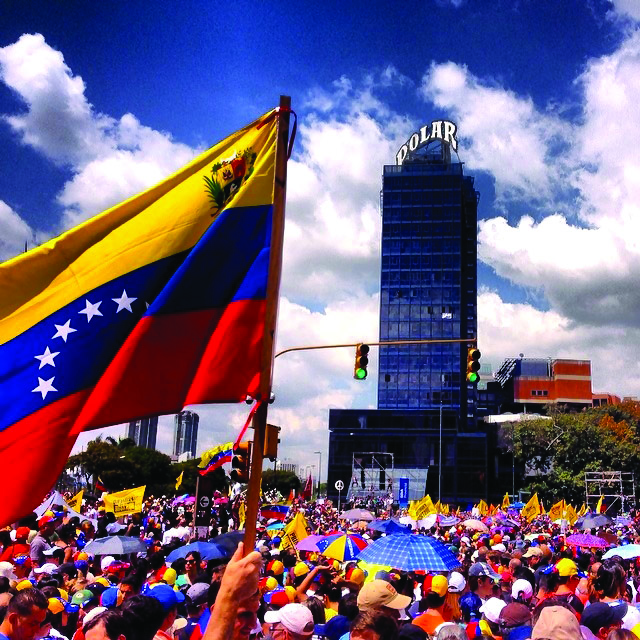
People on the bus started shouting, “The president just died!”
I couldn’t believe it. I hoped I could return safely to my house. Everyone was leaving their homes and banging pots and pans while public transportation collapsed. It was announced on TV that classes would be suspended for a week.
On March 5, 2013, on the side of Caracas I lived, people were celebrating in the streets, throwing fireworks. On the other side, people were crying and preparing themselves to visit the body of the president.
Every time I walked inside the subway I saw people with red shirts, families taking their children to see the president and people playing songs to remember him. The people of Venezuela had lived with Hugo Chavez for more than a decade. But with his death, I couldn’t help but worry about what would happen to the country and my family.
Ten years ago, I lived in Maracaibo, the second biggest city in Venezuela. Each Sunday, my family would gather to share the stories of the week in my grandmother’s house. We would all cook and watch movies, go to Mass together or visit the parks in the city.
But when I started doing charity work while in high school, I realized the middle class of my country lived in a bubble. I had never seen how poor people lived: naked children in the streets, lack of water and power in the houses, murders every day, dirty streets, rickety houses, schools without washrooms, broken windows in the schools, drug addiction rumors about young people everywhere.
When I moved to Caracas, I got another perspective on the country. I had never been in the capital, and that meant to live with a sunny but crisp weather, surrounded by mountains and beautiful people.
I would hike every weekend to el Avila, one of the mountains that surrounds Caracas’ valley. We enjoyed hearing the water flow and the birds sing. Each morning I would wake up and see the mountains surrounded by sun and blue sky. You could see the neighborhoods of the rich in the city and the shacks of the poor on the hills.
Hugo Chavez had been successful in the military when he was imprisoned for trying to overthrow the democratically elected president. When he came back in the public eye, he founded the Socialist movement and was elected president in 1999.
He modified the constitution in order to be re-elected for another term. He nationalized most industries in the country in accord with the communist movement of Fidel Castro and organized missions to improve medical health care and literacy. He also gave prepaid food and housing to thousands of poor people.
Inflation rose while the opposition organized strikes in the largest cities and many families moved from the country to the city.
My father had to travel on the subway every day for more than two hours to arrive to the university where he worked. The subway was crowded due to the over population in Caracas.
During the last 10 years, my family suffered robberies and threats by criminals. I couldn’t go out at night by myself, and I felt menaced at all hours of the day.
When Chavez died, everyone in my father’s work knew what was going to happen – that the country would soon spiral into more and more violence. They looked for jobs in other countries; my dad found a job in Houston.
In my childhood in Maracaibo, we would all learn Venezuelan Christmas songs at school, and teachers taught us how to prepare hallacas, a mix of pork, beans, veggies or chicken covered by a cornmeal shell.
When I visited my family in Houston at Christmas, I met the Venezuelan community there. They sold Venezuelan Christmas food at extremely high prices and trashed the country for its disorganization and living conditions. Most of them talked as if Venezuela wasn’t their home anymore.
Now I’m back sitting in the study hall of STU, hoping the situation in Venezuela will improve and trying to give the best of myself wherever I am.
If I am honest with myself, the country has been in a civil war. At least 20 people have been killed since student demonstrations started a month ago, but government sponsored gangs have been killing and kidnapping innocent citizens for years. We have the same number of dead people each day as if we were in a war.
Still, I search for hope and find it in people like my cousin. Before the protests started, I always believed he was one of those middle class boys who’d never get out of his bubble.
But since all this mobilization started, he’s the organizer of a student group that visits poor communities to promote justice in a non-political way.
It’s time for all of us to get out of our bubbles and search for solutions, not hate.
